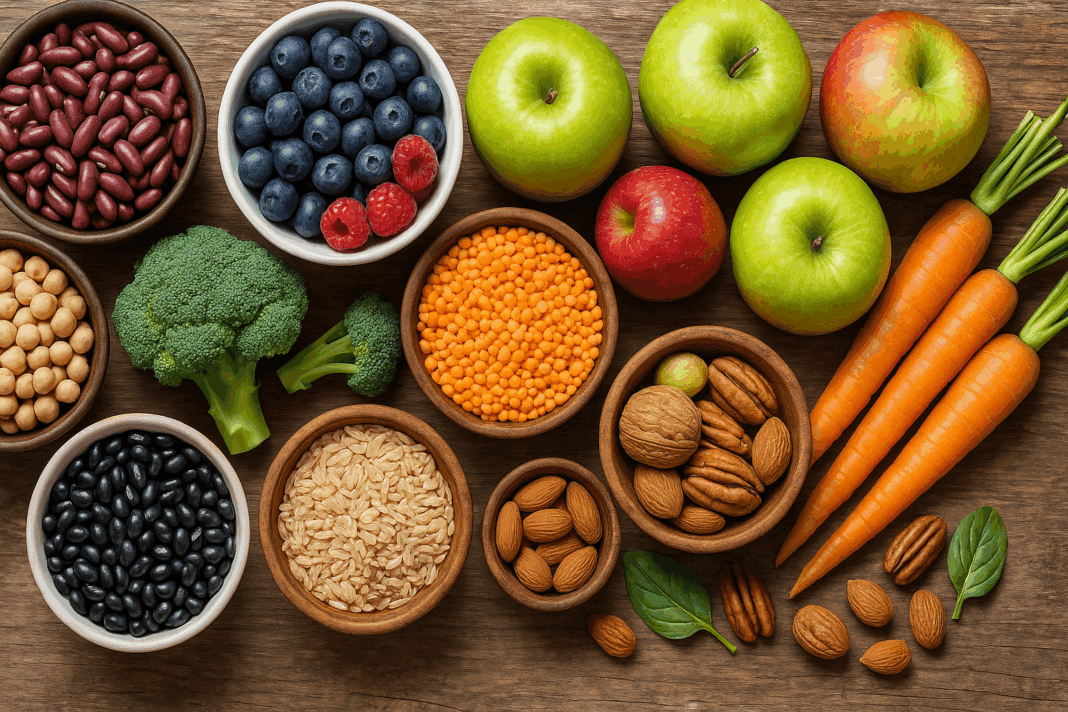A high-fiber diet is often heralded as a cornerstone of digestive health and a powerful tool for weight management. However, a question that has increasingly surfaced among health-conscious individuals is, can a high-fiber diet make you gain weight? This inquiry, though seemingly contradictory to the conventional wisdom that fiber helps with weight loss, reveals deeper layers of nutritional complexity. As with many aspects of diet and wellness, the truth about fiber’s impact on body weight is not as binary as one might assume. This article delves into the nuanced relationship between fiber intake, satiety, and body composition, aiming to illuminate both the benefits and potential misconceptions surrounding dietary fiber.
You may also like: The Ultimate Guide to Gut Healthy Meals: Best Meals for Gut Health and Nourishing Recipes You’ll Love
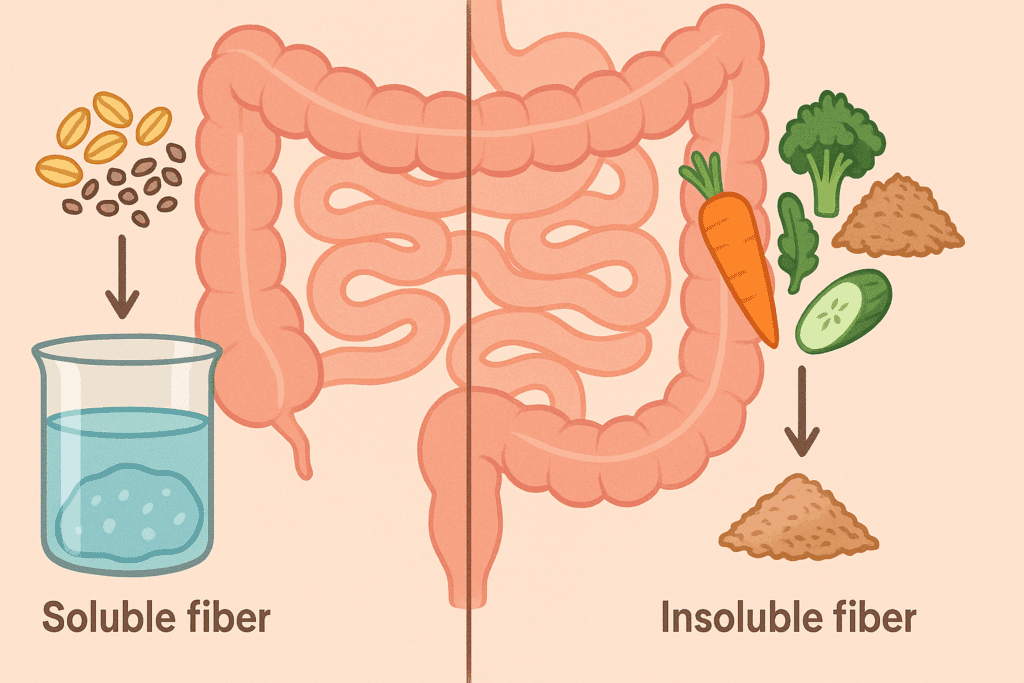
Understanding Fiber: The Indigestible Carbohydrate with Powerful Effects
To fully appreciate the role fiber plays in the body, one must understand its biological function. Fiber, a type of carbohydrate that the human body cannot digest, passes through the digestive tract largely intact. Found primarily in plant-based foods such as fruits, vegetables, legumes, and whole grains, dietary fiber is categorized into two main types: soluble and insoluble. Soluble fiber dissolves in water and forms a gel-like substance that slows digestion, while insoluble fiber adds bulk to stool and aids in regular bowel movements. Both forms of fiber are essential for maintaining gut health and play unique roles in digestive function.
Unlike other macronutrients that are broken down and absorbed, fiber’s resistance to digestion means it contributes minimal calories. Yet, it exerts a profound influence on satiety hormones, gastrointestinal transit time, and the gut microbiome. In doing so, fiber not only promotes fullness but also supports metabolic health by modulating blood sugar levels and reducing cholesterol. Despite its inability to be absorbed as energy, fiber is far from inert—it is metabolically active in ways that extend beyond caloric contribution.
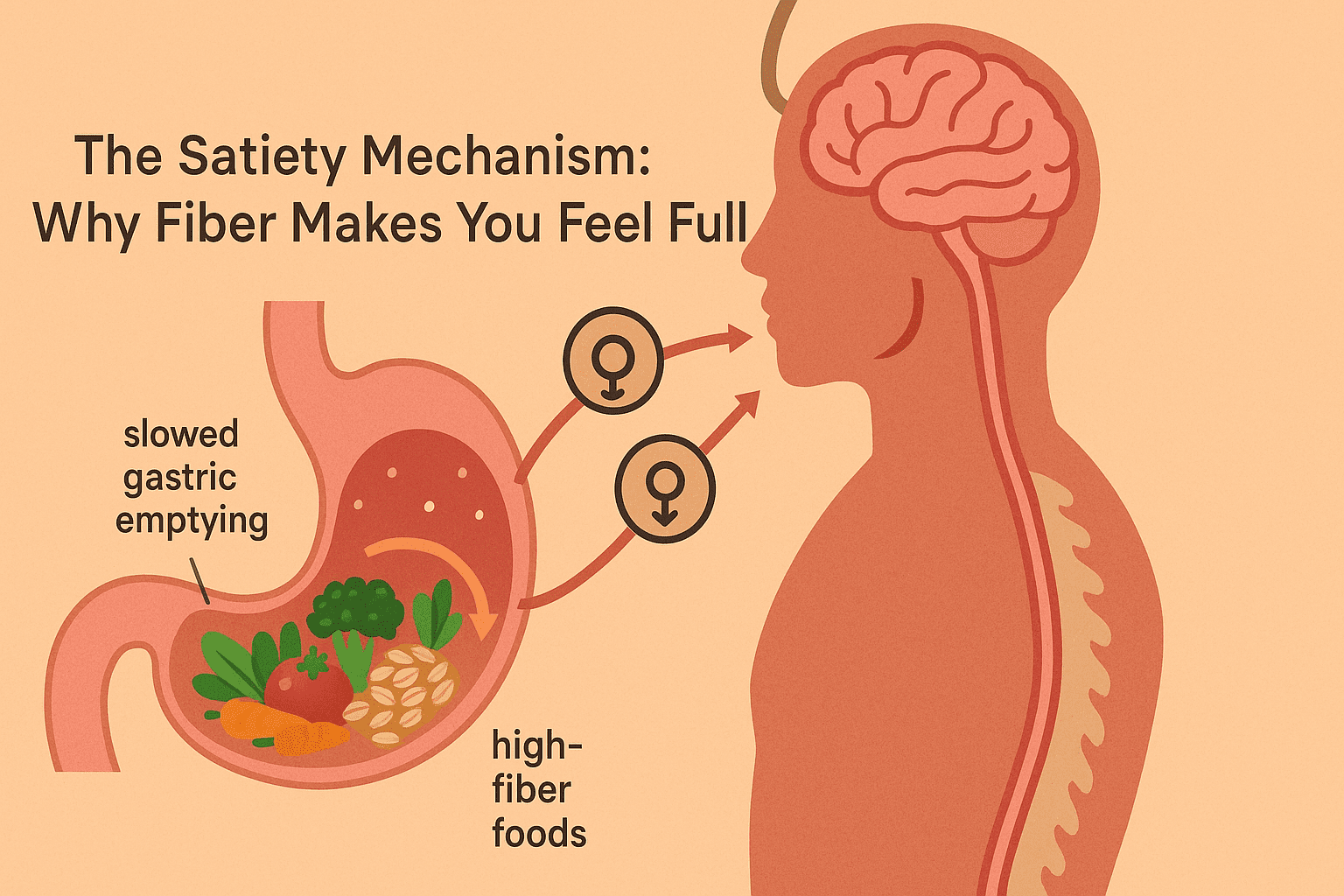
The Satiety Mechanism: Why Fiber Makes You Feel Full
One of the most celebrated attributes of fiber is its ability to promote satiety. But does fiber make you feel full, and if so, how? The answer lies in its interaction with digestive processes and the gut-brain axis. Soluble fiber slows gastric emptying, meaning food remains in the stomach longer, which helps prolong the sensation of fullness. This delay in digestion sends signals to the brain that reduce hunger cues, effectively curbing appetite and lowering overall calorie intake.
In addition, fiber-rich foods often require more chewing and take longer to eat, giving the body more time to register fullness. These physical characteristics, combined with fiber’s chemical properties, create a powerful combination for appetite regulation. The hormonal response is equally compelling—fiber intake stimulates the release of satiety hormones such as peptide YY (PYY) and glucagon-like peptide-1 (GLP-1), both of which are involved in signaling fullness to the brain. By enhancing these natural mechanisms, fiber serves as a valuable ally in controlling caloric intake and preventing overeating.
Can a High-Fiber Diet Make You Gain Weight? Examining the Nuances
While fiber is often associated with weight loss, the question can a high-fiber diet make you gain weight deserves careful consideration. In theory, fiber should aid weight management by increasing satiety and reducing calorie consumption. However, certain factors may lead to unintended weight gain when transitioning to a fiber-rich diet. For instance, individuals who increase their fiber intake without adjusting portion sizes or total caloric intake may inadvertently consume more food overall.
Moreover, many fiber-enriched or fiber-labeled processed foods are marketed as healthful options but contain hidden sugars and fats that contribute to excess calories. Snack bars, cereals, and baked goods may boast high fiber content while simultaneously delivering a caloric punch that undermines weight loss efforts. In such cases, it’s not the fiber itself that causes weight gain, but rather the surrounding ingredients and lack of dietary balance. Misinterpreting fiber’s role as a free pass to overeat can paradoxically hinder weight loss and promote weight gain.
Additionally, sudden increases in fiber consumption can lead to bloating and water retention, which some may misinterpret as fat gain. While this is a temporary physiological response rather than an actual increase in body fat, it may cause concern among those monitoring their weight closely. Understanding the context in which fiber is consumed is crucial for leveraging its benefits without falling into the trap of unintended consequences.
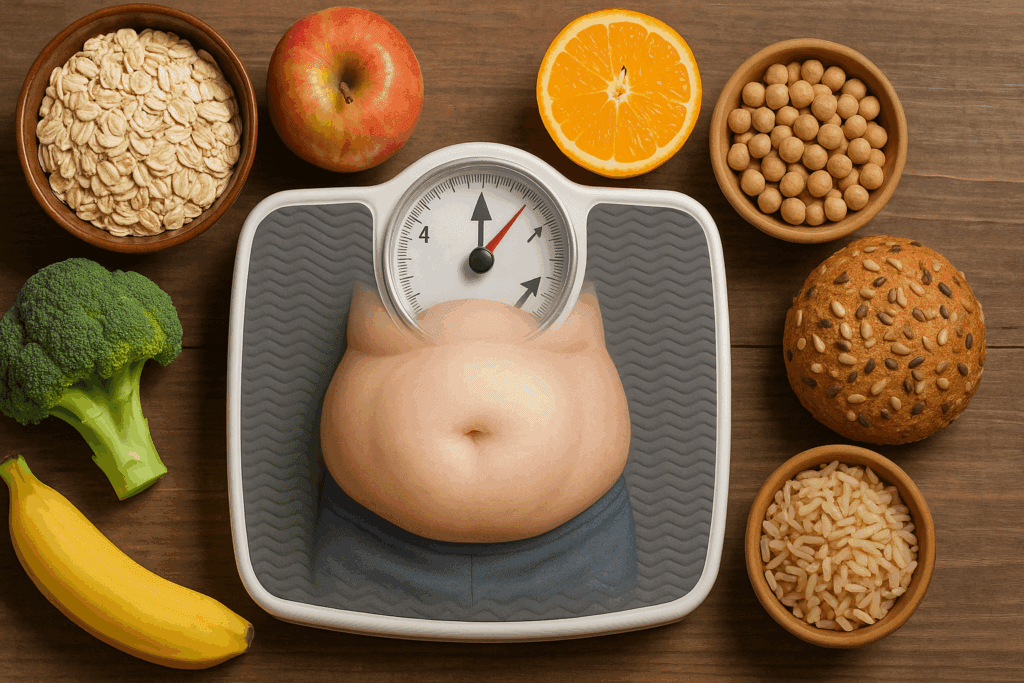
Fiber and Caloric Density: A Hidden Key to Weight Control
One of the most compelling arguments for fiber’s role in weight management lies in its impact on caloric density. Foods that are high in fiber typically have a low energy density, meaning they provide fewer calories per gram. Vegetables, fruits, legumes, and whole grains offer a rich array of nutrients and fiber while being relatively low in calories. This allows individuals to consume satisfying portions without exceeding their caloric needs, making fiber a natural ally in weight control.
By displacing higher-calorie, low-fiber foods, a fiber-rich diet helps reduce overall energy intake. This concept is supported by numerous studies demonstrating that individuals who consume more fiber tend to have lower body weight and reduced risk of obesity. When paired with mindful eating habits and an understanding of portion control, fiber becomes a strategic tool for achieving and maintaining a healthy weight. Therefore, the question does eating fiber increase your weight must be answered within the context of the total dietary pattern and caloric balance.
Gut Microbiota: The Fiber Connection to Metabolic Health
The relationship between fiber and gut health is well established, but emerging research highlights the profound influence of the gut microbiota on body weight. Dietary fiber acts as a prebiotic, feeding beneficial gut bacteria that ferment it into short-chain fatty acids (SCFAs). These SCFAs, such as butyrate, acetate, and propionate, have been shown to regulate metabolism, reduce inflammation, and improve insulin sensitivity—all of which are critical factors in preventing weight gain and promoting fat loss.
In particular, butyrate has been associated with enhanced fat oxidation and energy expenditure, suggesting that fiber may indirectly contribute to weight loss through its effect on microbial metabolism. The diversity and balance of gut bacteria play a pivotal role in determining how the body stores fat, extracts energy from food, and responds to dietary interventions. As such, a fiber-rich diet that supports a healthy microbiome is not only beneficial for digestion but also instrumental in long-term weight management.
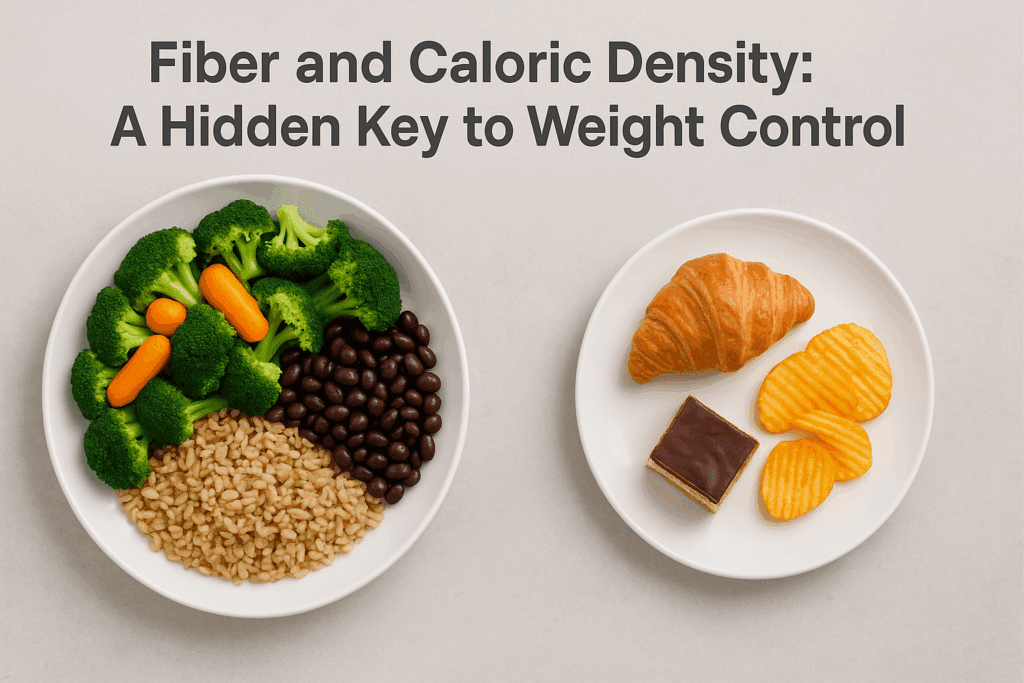
Can a High-Fiber Diet Make You Gain Weight If Combined with Processed Foods?
Returning to the focus keyword, can a high-fiber diet make you gain weight, we must explore one of the most overlooked aspects: the type of fiber consumed. While whole-food sources of fiber are nutrient-dense and beneficial, fiber added to processed foods may not confer the same metabolic advantages. Isolated fibers, such as inulin or polydextrose, are often included in manufactured products to boost fiber content without altering taste or texture. However, these additives do not always produce the same satiety or gut health benefits as natural fibers found in whole foods.
More concerning is the trend of combining added fiber with sugar, salt, and unhealthy fats to create the illusion of a healthful product. Consuming these processed options under the assumption that they promote weight loss can backfire, especially if they lead to excess calorie consumption. The illusion of healthfulness can result in what psychologists call the “health halo effect,” where people unconsciously eat more of a food they perceive as healthy. Thus, the type, source, and context of fiber are critical considerations when evaluating its impact on body weight.
Does Fiber Make You Gain Weight or Simply Shift Water Balance?
Another common concern relates to short-term weight fluctuations following increased fiber intake. Many individuals observe that they feel heavier or see a rise in scale weight after adopting a high-fiber diet, prompting the belief that fiber makes you gain weight. However, this phenomenon is more accurately attributed to changes in water retention and stool volume. Fiber attracts water into the gastrointestinal tract, which adds bulk to stool and may temporarily increase body weight.
This effect, while disconcerting to some, is not indicative of fat gain and usually stabilizes once the body adapts to the new dietary pattern. It is essential to distinguish between actual adipose tissue accumulation and transient shifts in body weight due to physiological factors. For those who weigh themselves daily, understanding these nuances can prevent unnecessary alarm and encourage long-term adherence to a fiber-rich diet. In this light, fiber’s role should be evaluated based on health outcomes rather than short-term fluctuations on the scale.
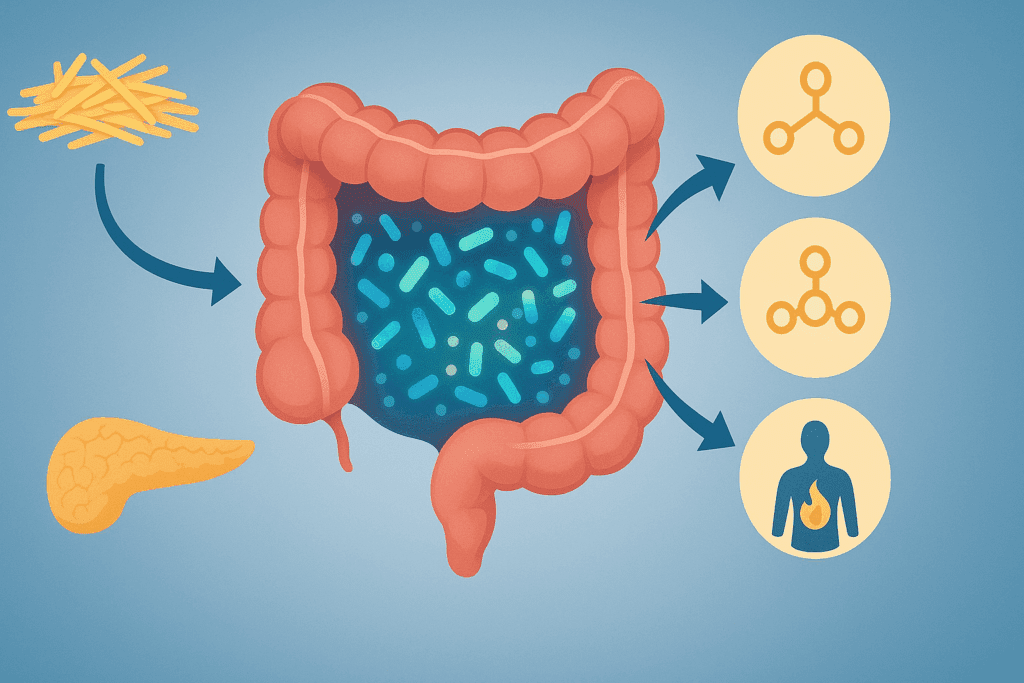
Fiber Diet for Weight Loss: Strategic Choices That Matter
To effectively use a fiber diet for weight loss, strategic planning is essential. Not all fibers are created equal, and their impact varies based on food source, preparation, and individual tolerance. Soluble fibers from foods like oats, beans, and flaxseeds are particularly effective for appetite regulation and blood sugar control. Insoluble fibers from whole grains and vegetables support bowel regularity and may indirectly aid weight loss by improving digestive efficiency.
Incorporating a diverse range of fiber-rich foods ensures a broad spectrum of prebiotic compounds that nourish different strains of gut bacteria. This diversity fosters a more resilient microbiome, which in turn supports better metabolic function. Portion control, mindful eating, and hydration are also key components of a successful high-fiber weight loss plan. Drinking plenty of water helps prevent constipation and bloating, common side effects during the transition to a higher fiber intake. When combined thoughtfully, these practices transform fiber from a passive component to an active agent of holistic health.

The Final Word: Can Fiber Make You Gain Weight or Help You Lose It?
The dichotomy presented by the question can fiber make you gain weight reflects broader misconceptions about nutrition. The answer is not a definitive yes or no, but rather a context-dependent understanding of how fiber interacts with other dietary components, lifestyle factors, and individual physiology. When sourced from whole foods and consumed as part of a balanced diet, fiber is an invaluable tool for promoting satiety, regulating metabolism, and supporting long-term weight control.
However, when misunderstood or misapplied—such as in the case of processed fiber-enriched products—fiber can contribute to weight gain by masking poor dietary choices. Awareness, education, and a commitment to whole-food nutrition are essential for maximizing fiber’s benefits while avoiding its potential pitfalls. Ultimately, fiber should not be feared but respected for its multifaceted role in human health.
FAQ: The Surprising Truth About Fiber and Weight Management
Can a high-fiber diet make you gain weight if you’re consuming it from processed sources? Yes, the source of your fiber matters significantly. Fiber derived from processed foods often comes alongside added sugars, refined oils, and excess calories. While the fiber may still contribute to digestive regularity, these accompanying ingredients can undermine your weight goals. Products like fiber-fortified snack bars, high-fiber ice creams, or cereal bars are often marketed as healthy but may contain more calories than a balanced homemade alternative. Therefore, can a high-fiber diet make you gain weight? Absolutely—if the fiber comes from highly processed or sugary sources that promote overconsumption.
How does fiber affect energy extraction from food and does eating fiber increase your weight through calorie absorption? Emerging research suggests that fiber may actually reduce the amount of energy absorbed from food. Certain types of fiber bind to fats and carbohydrates in the gut, preventing their full digestion and absorption. Moreover, when fiber is fermented by gut bacteria, it results in short-chain fatty acids (SCFAs), which improve metabolic health rather than increase body fat. Thus, the notion that fiber directly increases calorie absorption and leads to weight gain is inaccurate. Instead, fiber tends to create a more metabolically favorable environment that can help with weight management rather than hinder it.
Does fiber make you feel full even if it adds bulk without calories? Yes, and that’s one of fiber’s most beneficial effects. Soluble fiber forms a gel-like substance in the gut, which delays gastric emptying and increases the sensation of fullness. Even without being digested for calories, this bulk sends satiety signals to the brain. That’s why eating a fiber-rich salad or a bowl of lentils can reduce the urge to snack between meals. When you ask does fiber make you feel full, you’re really asking how non-caloric volume can impact hunger—and in fiber’s case, the answer is impressively.
Can a high-fiber diet make you gain weight due to overcompensation in portion sizes? In some cases, individuals new to a high-fiber diet may overestimate its appetite-suppressing effect and overeat as a result. They might assume that simply because a meal is high in fiber, it allows for unlimited portion sizes. This can backfire if caloric intake isn’t accounted for holistically. For instance, eating two cups of oatmeal with dried fruit and nuts could easily push you into a caloric surplus, even though each component is healthful. Thus, can a high-fiber diet make you gain weight? Yes—if it leads to a false sense of security around portion control.
Does fiber make you gain weight by increasing gut mass or water retention? Fiber can cause an increase in stool bulk and water retention in the gastrointestinal tract, especially during the initial stages of a diet change. This increase in mass might reflect temporarily on the scale but is not equivalent to fat gain. Insoluble fiber draws water into the intestines, aiding motility but also adding to body weight in the short term. While this might appear as weight gain, it’s important to differentiate between water/stool weight and actual increases in fat stores. In this case, fiber is merely facilitating normal digestive function, not contributing to obesity.
Is a fiber diet for weight loss equally effective for everyone? Not always. While fiber is generally beneficial, individual factors like gut microbiome composition, metabolic rate, and digestive sensitivity can influence how a person responds. For example, someone with a sluggish metabolism or imbalanced gut flora might not derive the same weight loss benefits as someone with a diverse, healthy microbiome. Moreover, certain individuals experience bloating or cramping with sudden increases in fiber, which can affect adherence to the diet. Thus, while a fiber diet for weight loss is effective in principle, its real-world impact depends heavily on individual physiology.
How can you tell if your fiber intake is helping or hindering your weight goals? It’s crucial to monitor more than just the number on the scale. Improved satiety, reduced cravings, and better blood sugar regulation are all positive signs that fiber is working in your favor. Conversely, if you notice persistent bloating, erratic hunger, or unexpected weight gain, you may need to reassess the sources and balance of your fiber intake. Journaling meals and noting digestive patterns can offer insights into how your body is responding. Rather than asking only does fiber make you gain weight, a better question is whether your fiber choices align with your overall dietary and metabolic goals.
Can fiber make you gain weight if consumed in liquid form, like smoothies? Blended foods and smoothies, even when fiber-rich, don’t always provide the same satiety as whole foods. Liquids move through the stomach more quickly, which may reduce the fullness effect that fiber usually provides. In a smoothie, fiber may be mechanically broken down, changing how it interacts with the digestive system. Additionally, the caloric density of smoothies can be high, especially with added sweeteners or nut butters. Therefore, can fiber make you gain weight when consumed this way? If not carefully formulated, yes, because the form in which fiber is consumed matters as much as the quantity.
Does eating fiber increase your weight if your activity level is low? If you’re leading a sedentary lifestyle, even healthful diets can lead to weight gain if energy expenditure is consistently below intake. Fiber-rich foods still contain calories—particularly when paired with grains, legumes, and healthy fats. Without physical activity to create a caloric deficit or promote metabolic health, these extra calories can contribute to weight gain. So, does eating fiber increase your weight? Not inherently, but in the context of inactivity and excess energy intake, even high-fiber diets can tip the scale.
Psychological Impact: Can a High-Fiber Diet Make You Gain Weight Due to Misconceptions? Absolutely. Believing that all high-fiber foods are low-calorie can create a mental loophole where people give themselves permission to overeat. This cognitive bias—known as the health halo effect—can result in consuming large amounts of calorie-dense “healthy” foods like whole grain granola, trail mix, or energy bars. If people aren’t mindful of overall portions and calorie content, can a high-fiber diet make you gain weight simply because of this psychological trap? Yes, especially when individuals don’t account for energy balance. Recognizing and addressing these mental shortcuts is as important as dietary planning itself.
Conclusion: The Powerful Role of Fiber in Weight and Gut Health—What You Should Know
Understanding the relationship between fiber, weight, and digestive wellness is essential for anyone seeking sustainable health improvements. The focus keyword can a high-fiber diet make you gain weight uncovers the intricacies of dietary fiber’s impact, challenging the oversimplified narratives often perpetuated in popular media. Through its effects on satiety, microbiome composition, and caloric density, fiber proves to be a powerful asset when used wisely.
The keys to success lie in choosing whole, unprocessed fiber sources, balancing intake with adequate hydration, and aligning fiber consumption with overall caloric goals. While temporary changes in water weight or digestion may occur, these should not overshadow the long-term benefits of a fiber-rich diet. For those navigating the world of gut health and holistic nutrition, fiber offers a potent, scientifically grounded pathway to better health—one that deserves both appreciation and thoughtful application.
By demystifying the question of whether fiber contributes to weight gain, this article provides a comprehensive framework for incorporating fiber into a health-promoting lifestyle. In doing so, it bridges the gap between traditional wisdom and emerging science, empowering readers to make informed, evidence-based decisions about their dietary habits and wellness goals.
Further Reading:
Does Eating High-Fiber Foods Cause Weight Gain? Here’s What a Dietitian Says
Making one change — getting more fiber — can help with weight loss

